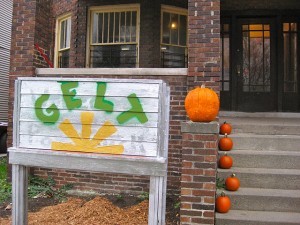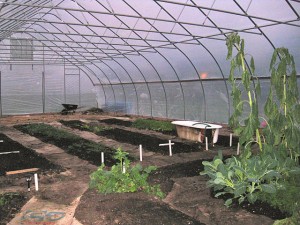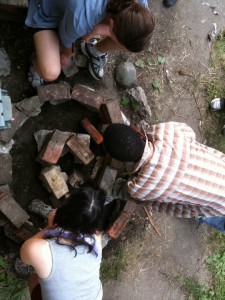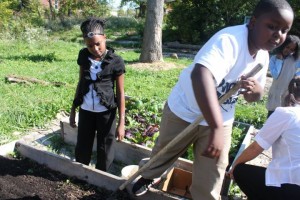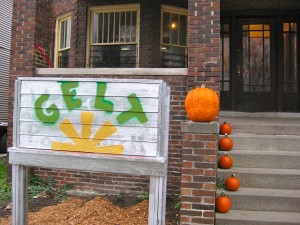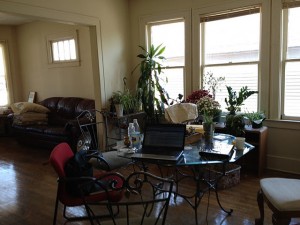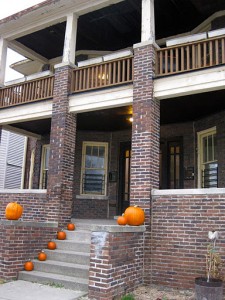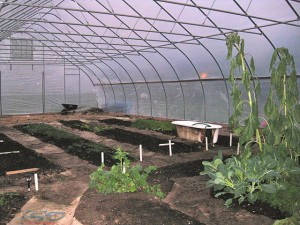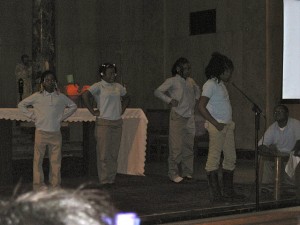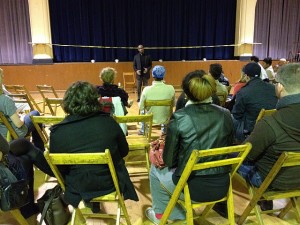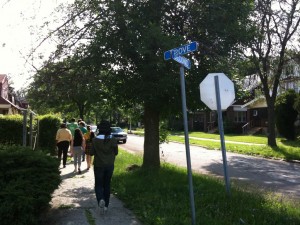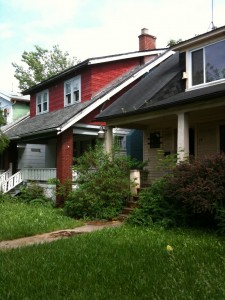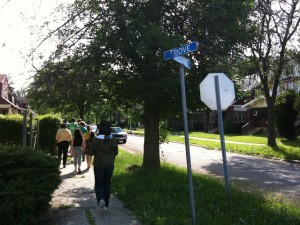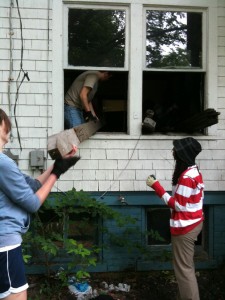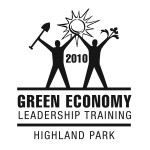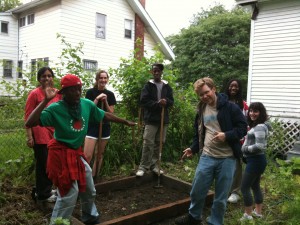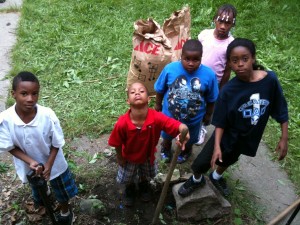(Global Exchange’s Michigan team is working with the local community in Detroit to transition it to a clean, green economy starting with Highland Park. One of our Michigan organizers, Scott Meloeny introduces the Green Economy Leadership Training (GELT) summer program.)
[Cross-posted from It’s Getting Hot in Here.]
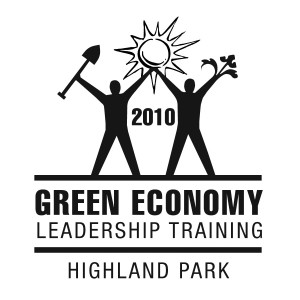 This country has been built and influenced by each generation that has come to pass. While we still face major social issues, these previous generations have contributed some of the most impressive feats known to man, developing unique and marketable skills and tools that have fueled an extraordinary amount of growth and set the highest standard of living the world has ever seen. However, our generational brethren also left behind something else: a very specific mind set on the world. A mind set that can be seen today powering our infrastructure, shaping our culture, and instilling our values. One that was relative to the times of our mothers and fathers, grandparents and great-grandparents but now stands outdated and dangerous.
This country has been built and influenced by each generation that has come to pass. While we still face major social issues, these previous generations have contributed some of the most impressive feats known to man, developing unique and marketable skills and tools that have fueled an extraordinary amount of growth and set the highest standard of living the world has ever seen. However, our generational brethren also left behind something else: a very specific mind set on the world. A mind set that can be seen today powering our infrastructure, shaping our culture, and instilling our values. One that was relative to the times of our mothers and fathers, grandparents and great-grandparents but now stands outdated and dangerous.
Bob Dylan was right when he said “the times, they are a changin’.” In fact, times have changed. One doesn’t need to look very far to see that our previous generation’s systems, values and ideas were built to be supplied by a finite source that right now is exhausting our planet’s resources, while destroying its species and environment. It is here we can witness most explicitly our generational divide. One in which past generation’s values, skills and mind sets are no longer suitable or sustainable for us. We need to embrace this divide. But we must do so carefully and in a way that equips our peers with new skills, values and perceptions, and also enables older friends, families and neighbors to partake and share in building a new holistic, clean energy economy. It’s time to have exponential learning overcome exponential growth. It’s time to value accumulated wisdom overcome accumulated wealth.
BUILDING A BRIDGE TO SOMEWHERE
To bridge this multi-generational divide we need to integrate education and training, applying both to communities and peoples who need it the most. Unfortunately, past generations relied on a model where the privileged would go off to higher learning, while others were left behind in communities ill-equipped to make necessary, sustainable changes for growth. As we have seen recently with our older college grads, the path of post high school education does very little to prepare one for the skills needed to mend social, economic and cultural inequalities. This is where we believe the first steps can be taken. The skills and knowledge that go beyond the classroom and make tangible impacts in the community is what we at Global Exchange see as a potential equalizer for such existing inequalities.
The Green Economy Leadership Training (GELT) is the first program from GX to begin to integrate education and community while applying empowering solutions derived from these community classrooms. GELT provides present day skills, knowledge and experience that present and future generations will need to not only assist in building a new energy economy, but also to live in a way that creates a healthy and positive synergy within our world. With technical skills in renewable energies, energy efficiency, permaculture and community development combined with personal skills in chi-wellness, yoga, nutritional health and lifestyle consciousness, GELT seeks to train and empower generations of people to collectively build, work and live in the clean energy economy.
THE HIGHLAND PARK PROJECT
The Green Economy Leadership Training, a Global Exchange and GreeNation program, calls Highland Park (HP), Michigan headquarters. Once a model city for all to follow, HP no longer finds its current infrastructure and skills suitable for a clean economy transition. However, HP has the unique opportunity to restructure its system, re-skill its workforce and reactivate its pioneering attitude that once led a nation decades ago and become one of the first clean economies of its kind.
Although only its first year, GELT will look to achieve some watershed moments by the end of summer. Already, ten individuals have received their certification in permaculture. Even more are being trained on how to weatherize homes and will then go out and perform up to 200 weatherizations throughout the city. This is especially important, as up to 40% of Highland Park residents live under the poverty level, making it very difficult for many to adequately heat their homes. Proper weatherizations will provide a 10-15% decrease in monthly bills, giving some financial relief to local residents but more importantly providing them a safe, warm home during Michigan’s long winters. In addition to training, classes in demand-side economics for renewable energy and energy efficiency will give participants the understanding of what it takes to transition to a clean energy economy at both the local and national level.
2010 Summer GELT Course Catalog
GELT is also building for the long term to create a model clean energy economy and it all begins at the micro level. It’s here GELT is seeking to create a foundation for a city wide food system that will provide nutritional food year round to all its residents as well as install a farmers market that will be available in the fall of 2011. This will be done by redeveloping vacant lots throughout the city and connecting them into block based cooperatives that give ownership to residents. However, achieving food security for local residents will not be our only goal. GELT will also look to implement a micro-grid utility over the next three years. This entity will provide energy to residents in a variety of ways. First, by converting two homes into utilities that provide electricity and hot water (solar photovoltaic and solar hot water) through renewable sources, as well as heating and cooling (geo-thermal). Residents will then have the opportunity to reap the benefits of renewable energy and ownership of their power production. These localizes systems will look to employ community residents so that we may come full circle in providing a community based model of the clean energy economy.
The Green Economy Leadership Training will be a flagship program of Global Exchange, as we will continue to run more programs throughout the fall and winter and into the new year until we can make our vision a reality; a community model of a holistic, clean energy economy. It’s always been said that a narrow mind set is an obstacles to change, but we hope through our community actions to overcome even this profound psychological barrier. GELT seeks to be one of many actions that will bring about tangible solutions for creating a model clean energy economy in Highland Park, Michigan. Because as today’s generational shift continues, we must fully embrace the responsibility to continue healthy evolutions in this country as well as doing what we can to reverse problematic ones.
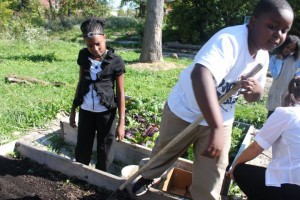 While some people look at Detroit and see problems, we see there is no better place to start building a new economy than in Detroit.
While some people look at Detroit and see problems, we see there is no better place to start building a new economy than in Detroit.
